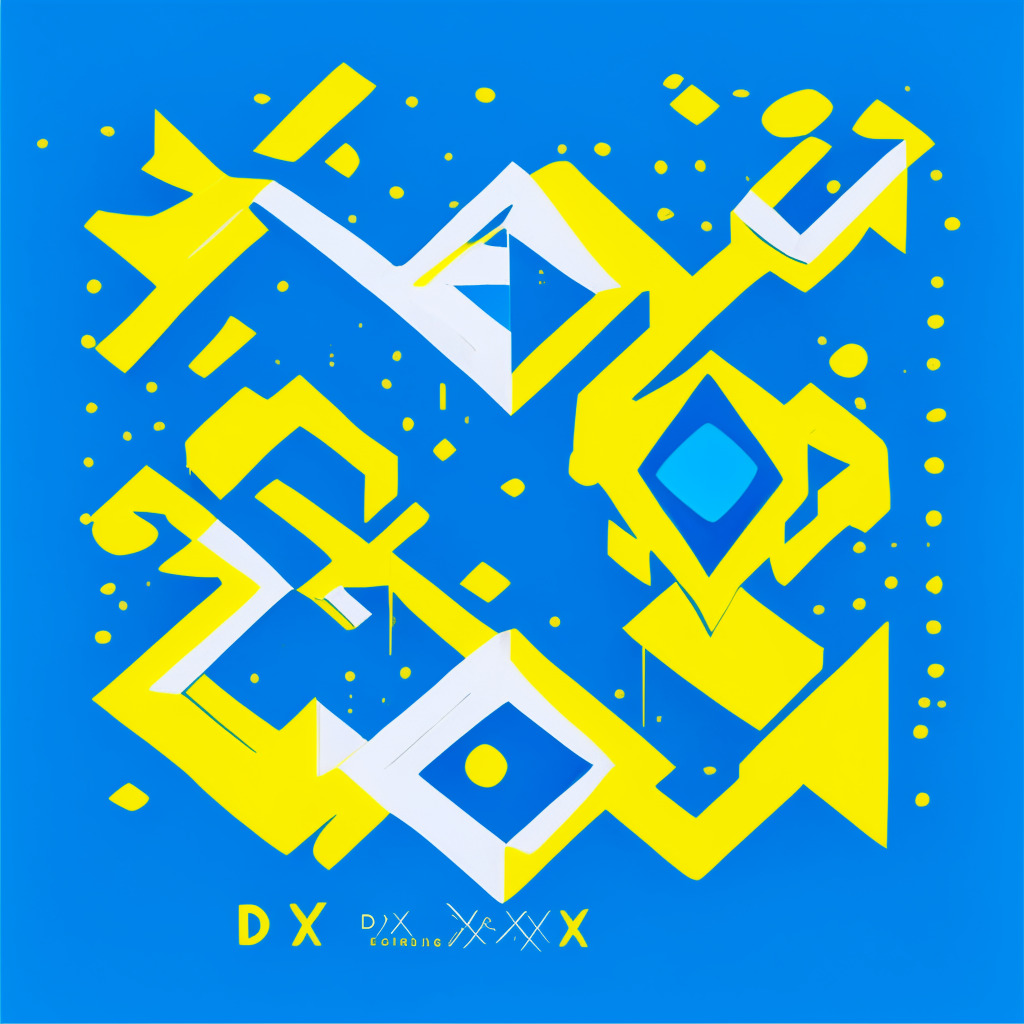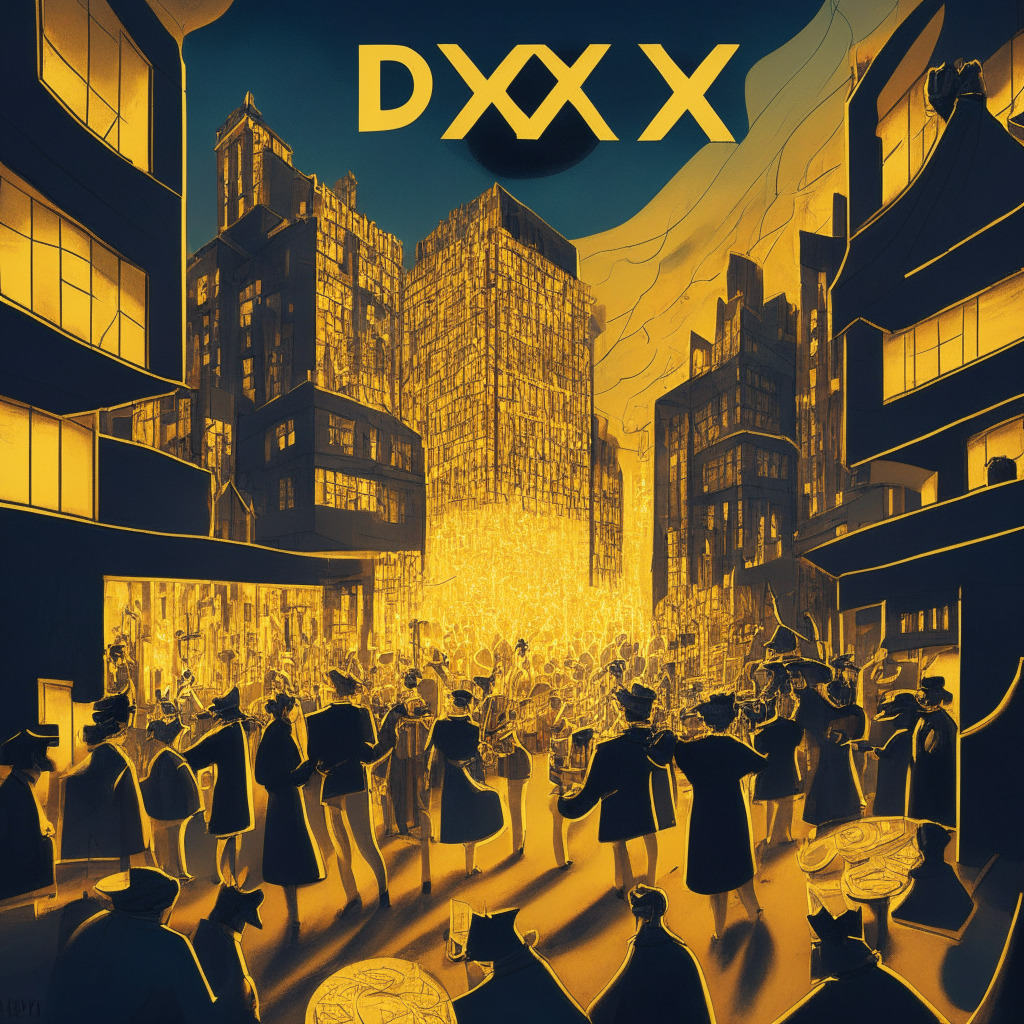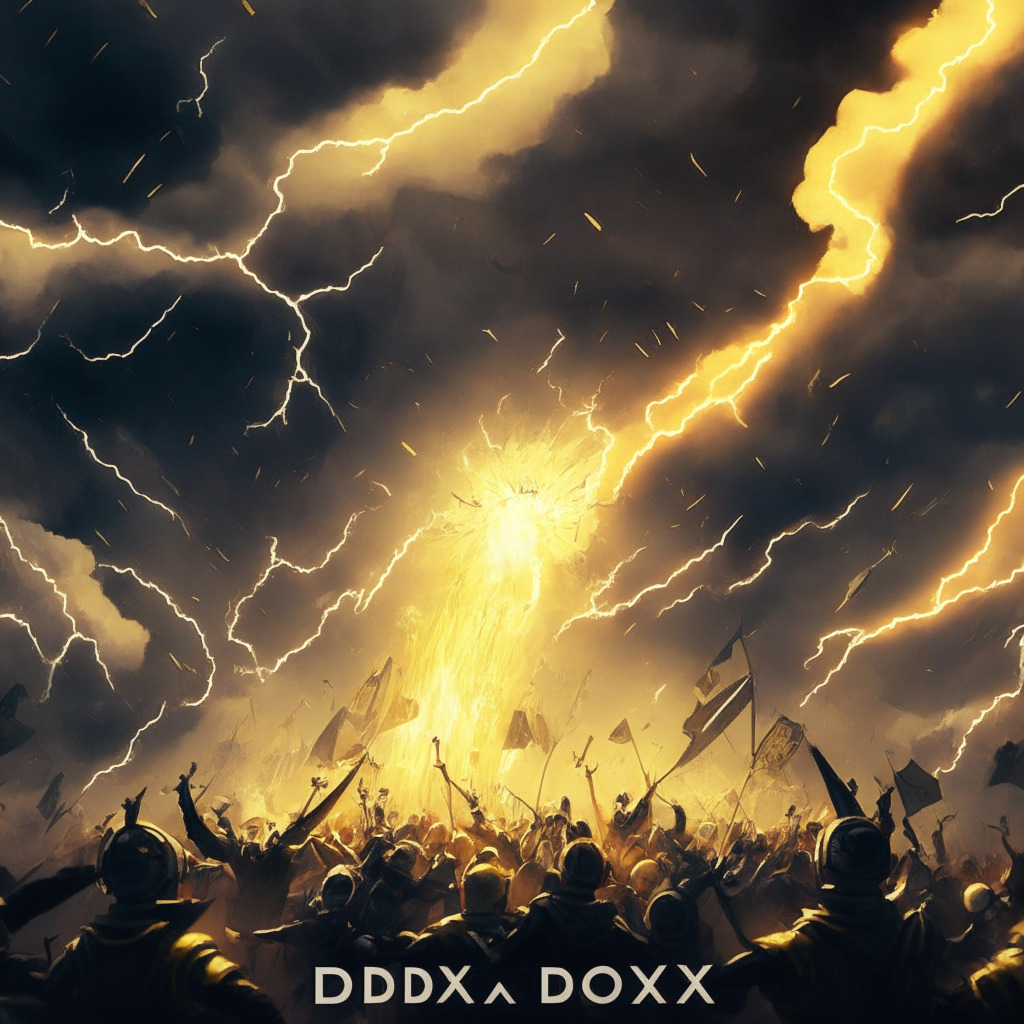“dYdX is introducing decentralized order books to their platform and is shifting from the Ethereum network to the Cosmos network. CEO Charles d’Haussy proposes an innovative blend of decentralization and speed, hosting order books within the validators. This ambitious transition seeks to achieve a ‘purely decentralized’ order book exchange while ensuring high-speed crypto derivative responses.”
Search Results for: DYdX
Decentralized Exchange dydx’s Token Migration to Layer 1: A Unanimous Move or Market Hype?
“Decentralized exchange dydx gains almost universal user approval to migrate to its latest version, adopting DYDX as its Layer 1 token for its imminent blockchain. The community’s vote facilitates the token’s transition from Ethereum to a Layer 1 appchain within the Cosmos ecosystem.”
Major dYdX Token Release: Astonishing Growth Opportunity or Risky Gamble?
Decentralized exchange dYdX is preparing to unlock 6.52 million DYDX tokens worth around $14 million for the community treasury and rewards. This major token unlock emphasizes the complex interplay of fast-growth potential and inherent risk in the nascent blockchain markets.
Decentralized Exchange dYdX’s Critical Decision: Cut Rewards and Save a Million or Preserve Status Quo?
“dYdX community members are deciding whether to cut rewards for liquidity providers or maintain the current structure. If approved, the proposal could save the business $1 million monthly and reduce issuance of its dYdX token. However, limiting the token issuance could potentially boost their prices, resulting in a communal benefit.”
dYdX Decentralized Exchange Switching to Cosmos: Promising Vision or Significant Risk?
The decentralized exchange (DEX), dYdX, has launched its public test network on the Cosmos blockchain, marking a significant step towards transitioning from its Ethereum-based version. The new test network offers users advanced capabilities and highlights the company’s strategic shift for improved performance efficiency, responsiveness, and scalability.
dYdX Token Surges Amid SEC Lawsuit Against Binance: Regulation vs Innovation Debate Intensifies
Decentralized exchange dYdX’s native token value surges after the SEC files a lawsuit against Binance for allegedly violating federal law. The case could either strengthen the argument for more stringent regulation or bolster belief in innovation without excessive regulatory interference.
dYdX’s Decentralization Journey: Balancing Governance & Efficiency with subDAOs
dYdX, a decentralized platform known for perpetual contracts, is exploring the establishment of additional subDAOs to further decentralize its ecosystem management. As dYdX upgrades to its fourth version on the Cosmos blockchain, it aims to create a more inclusive governance model by allowing the wider community to actively participate in decision-making, potentially setting a precedent for decentralized trading platforms.
Lido Enlists Cosmos Projects in a Liquid Staking Shift: A Blockchain Tsunami or a Centralization Risk?
“Lido, a significant player in the Ether staking landscape, collaborates with projects from the Cosmos blockchain ecosystem, indicating growing interest in liquid staking. With $16 billion in derivatives, liquid staking has become a major strategy for digital asset investors, providing inter-chain transaction opportunities and increased liquidity while also raising concerns about centralization.”
Emerging Crypto Landscape in Asia: Boon or Bane for Institutional Adoption?
“Institutional adoption of digital assets in Asia is on the rise due to improved regulatory clarity, with key adopters including South Korea, Hong Kong, Japan, and Singapore. However, progress varies across countries. Despite hurdles, the digital asset market’s infrastructure has noticeably strengthened, indicating increased market maturity.”
Crypto Regulation: SEC’s Stance Under Scrutiny Amidst Regulatory Inconsistencies and Market Concerns
Gary Gensler, SEC Chair, aims to place cryptocurrencies under SEC’s regulatory oversight, citing widespread noncompliance within the crypto industry. However, recent US court decisions challenge a blanket crypto regulation, including exceptions for specific cryptocurrencies like XRP. These evolving regulatory scenarios have spurred concern about stifling innovation and driving away crypto businesses.
Bridging the Gap: Synthetix Innovates to Reduce Friction in DeFi Adoption
Synthetix plans to launch Synthetix V3 protocol alongside its decentralized exchange front-end, Infinex, to reduce friction in the DeFi sector. The new protocol aims to provide a seamless transition from conventional exchanges to decentralized ones, and help DeFi become a potent rival to traditional financial systems. However, it must address challenges like regulatory compliance and system security.
Chronicle’s Leap Forward: Lower Gas Fees, More Networks and Integrity Questions Unanswered
“Chronicle, the second-largest oracle provider, is set to expand its services to other networks, thereby introducing more competition to the oracle landscape. The Chronicle Protocol aims to reduce gas fees by 60% envisioning higher platform utilization and maintaining uncompromised data integrity with data origin monitoring user dashboards.”
Navigating the Bitcoin ETF Maze: Analyzing SEC Delays, Market Volatility, and Portfolio Diversification Strategies
The U.S. SEC has delayed rulings on Bitcoin ETFs until October 2022, causing a mix of hope and apprehension among crypto enthusiasts. BlackRock’s proposal is particularly hopeful. Meanwhile, volatility in Bitcoin’s price leads analysts to recommend diversifying portfolios with overlooked altcoins like Maker (MKR).
Shackles or Safeguards? Federal Reserve’s Crypto Oversight Fuels Global Expansion
The Federal Reserve’s intensified scrutiny of banks’ cryptocurrency activities has sparked criticism from Republican lawmakers who argue this deters institutions from participating in the digital asset landscape. The Fed’s new requirements may potentially suppress the progress of decentralized finance. Amidst this, U.S. regulations on digital assets remain unclear, pushing some crypto companies to explore alternative markets overseas. The discourse focuses on balancing effective supervision with fostering blockchain innovation.
Navigating the Bear Market: A Spotlight on Promising Cryptocurrencies Amid Volatility
“In today’s tumultuous crypto market, investors explore suitable cryptos to invest in during the enduring bear market. Bitcoin’s challenges illustrate sector volatility; however, interest from global governments and institutions like BlackRock provide optimism. Cryptos like THORChain, Wall Street Memes, dYdX, Sonik Coin, and Bitcoin SV show promising fundamentals and bullish outlooks.”
The Great Debate: U.S. Crypto Development Hiatus or Reinvention?
Antonio Juliano, founder of dYdX, suggests a hiatus for US-focused crypto development due to the austere regulatory framework. He encourages startups to explore non-US markets for less regulatory ambiguity and swifter growth. However, the CEO of Coinbase, Brian Armstrong, is confident in US adaptability, contradicting Juliano’s decade-long pause suggestion.
Navigating U.S. Crypto Regulations: Retreat or Stand Ground for Long-Term Survival?
Antonio Juliano, founder of dYdX, suggests crypto developers should shift their focus from the convoluted U.S. regulatory environment to friendlier overseas markets for the next five to ten years. His perspective sheds light on the industry perception that U.S. lacks definitive digital asset regulations. However, views differ, with some believing that despite current regulatory obscurity, pioneers can seek clarity and establish a safe, legal operating ground in the U.S.
Coinbase’s Ethereum Layer-2 Blockchain: Dominance in Uncertain Waters or Just a Passing Wave?
Coinbase’s Ethereum layer-2 blockchain, Base, is fully public and supported by 100+ decentralized applications. Despite recent launching, it already ranks fifth among layer-2 solutions with a total value locked (TVL) of $140 million. Revealing fast adoption and potential for growth, Base is a key player in the ever-competitive crypto landscape.
Exploring the BALD Token Mystery: Dramatic Surges, Plunges, and Possible Manipulation in Crypto Markets
“The BALD token surged 4,000,000% before crashing as deployers withdrew liquidity, leaving investors reeling. Speculations tie the token’s creator wallet to Alameda Research, linking activity potentially to Sam Bankman-Fried. However, due to Bankman-Fried’s ongoing legal issues, this seems improbable. This incident accentuates crypto market vulnerability and the necessity for investor vigilance.”
DeFi’s Dance with Decentralization: Innovation or Compromise?
“The DeFi space is dynamically evolving, with claims that centralized exchanges may become gateways for DeFi. However, this may lead to potential centralization, contrasting DeFi principles. Furthermore, the new US Senate bill has stirred anxiety in the DeFi community, emphasizing the need for balanced regulations.”
Centralized Exchanges and DeFi: Pathway to Harmony or Inevitable Clash?
Charles d’Haussy, CEO of dYdX Foundation, envisions a future where centralized exchanges coexist and collaborate with decentralized finance (DeFi) platforms. He believes these exchanges could serve as gateways to DeFi, providing integrated, user-friendly services, and enhancing the overall crypto experience for users. However, achieving this harmonious coexistence will require a supportive regulatory setup.
Decentralized Lending: The Top Five P2P Platforms Disrupting Traditional Banking
“Decentralized Peer-to-Peer lending platforms like Aave, Compound, MakerDAO, dYdX, and Fulcrum transform the traditional lending system. Leveraging blockchain technology for operations, they offer flexible terms and competitive returns, fostering transparency and independence from traditional banks.”
The Duel of Decentralization: Bitcoin ETFs and The Future of Cryptocurrency
Debate continues to rage around a potential Bitcoin ETF, the effects of mainstream investment on decentralization, and the scrutiny of centralized platforms by the Securities and Exchange Commission. As Ethereum trades confidently, the dYdX Foundation’s choice to develop its own blockchain also gains attention.
Power Plays in Crypto: Polygon Labs Leadership Transition Amidst Blockchain Evolution
“Leadership transitions in digital currencies have ripple effects, potentially impacting the organization and the crypto space. Recently, Polygon Labs’ president, Ryan Wyatt, announced his departure, with Marc Boiron, the existing CLO, assuming the CEO role. These changes coincide with Polygon’s planned upgrades under ‘Polygon 2.0’, aimed at decentralizing governance.”
Polygon 2.0: Navigating Global Regulatory Hurdles and Community Control Challenges
Polygon unveils its upcoming project, Polygon 2.0, focusing on development and deployment outside the US amid a tough regulatory environment. With the aim to attract the global community’s attention, Polygon 2.0 will be a network of ZK-powered L2 chains, emphasizing community-driven decisions and facing challenges from US regulatory crackdowns on digital assets.
Crypto Exchanges Exit or Embrace Canada’s Regulatory Climate: Analyzing Strategies
Bybit exits the Canadian market due to recent regulatory developments, joining other exchanges like Binance, OKX, Paxos, dYdX, and Bittrex. In contrast, Coinbase, Kraken, Gemini, and Shakepay have chosen to engage with regulators and navigate the evolving crypto landscape by filing pre-registration undertakings with Canadian Securities Administrators.
Exiting Canada: Bybit’s Move Sparks Crypto Regulatory Compliance Debate
Bybit is pausing its services for Canadian users due to recent regulatory developments in the country. The Dubai-based platform will stop accepting account opening applications from Canadian nationals or residents starting May 31. As Bybit exits Canada, it expands into other markets like Kazakhstan, highlighting the increasing importance of regulatory compliance for crypto firms.
Coinbase Cloud Joins Chainlink as Node Operator: Boosting Decentralization and Smart Contract Security
Coinbase Cloud announces a partnership with blockchain oracle network Chainlink, operating as a node operator to improve decentralization and smart contract reliability. By leveraging its global infrastructure and blockchain data expertise, Coinbase Cloud aims to enhance Chainlink network’s security and reliability, connecting smart contracts to data and systems.
Ethereum’s Block Finality Crisis: Uncovering Security Gaps and Ensuring Future Stability
The Ethereum blockchain experienced a temporary loss of block finality last week, raising concerns about its functionality and security. The cause remains under investigation, with potential consequences including security issues like reorgs. Incidents have exposed areas for improvement in creating a more resilient Ethereum network, emphasizing the importance of finality for blockchain stability.
Ethereum’s Double Troubles: Resilience vs. Reliability Debate in Blockchain’s Future
The Ethereum network recently faced two performance issues within 24 hours that temporarily halted block finalization. Though the network recovered, concerns about its reliability resurface, potentially affecting market confidence and Ethereum’s role in the $27 billion total value locked across various financial infrastructures and applications.
Binance Exits Canadian Market: Analyzing Impacts and Regulatory Tensions
Binance is withdrawing from the Canadian market due to new stablecoin guidance and investor limits for crypto exchanges, joining other crypto businesses like OKX and dYdX. The exit raises concern over reduced competition and innovation in Canada, while highlighting the ongoing tension between regulators and cryptocurrency companies.
Ethereum’s Network Outages: How Growing Pains Affect Blockchain Security and Adoption
The Ethereum blockchain experienced two technical outages within 24 hours, causing concerns about network stability and security among users. These incidents raised valid questions regarding the platform’s ability to handle its growing adoption while maintaining consistent and secure performance.































